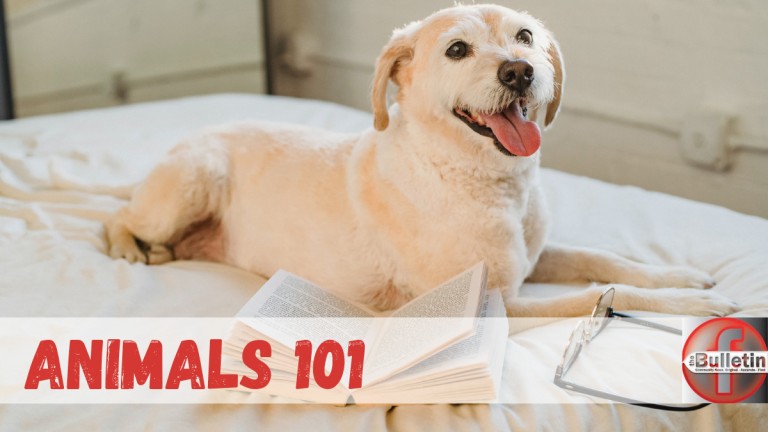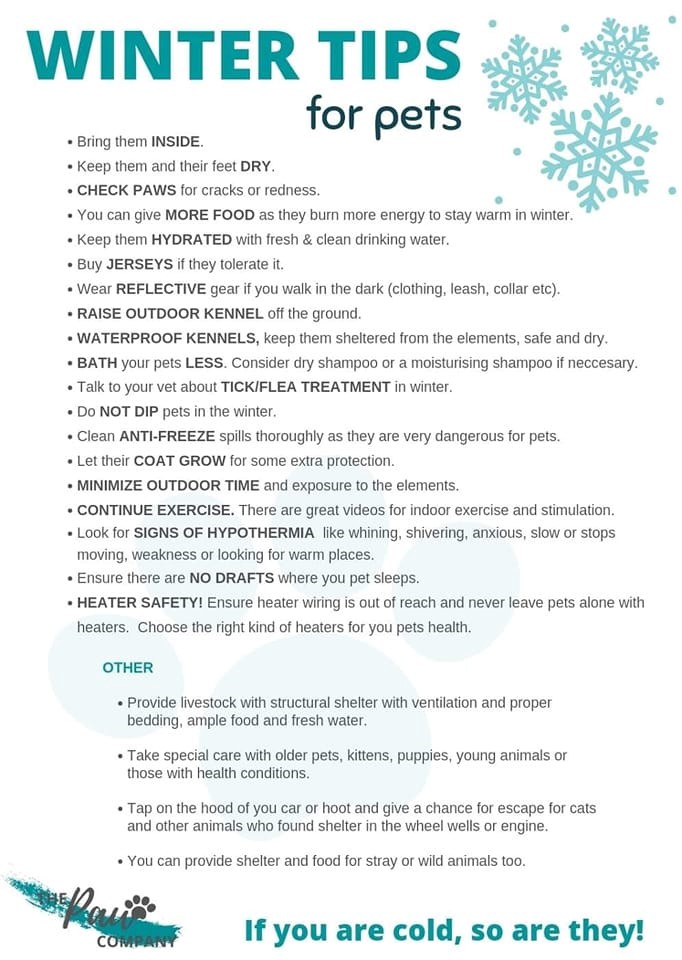
COLD WEATHER TIPS TO KEEP YOUR PETS WARM THIS WINTER.
With winter in full swing, it is our responsibility to keep our pets safe and warm and it is also required by law. All animal owners whether domestic animals, farm animals, or wildlife, are reminded to provide adequate shelter from adverse weather conditions.
MYTH: Cats and dogs are resistant to cold weather because they have fur.
FACT: They do feel cold and are susceptible to frostbite and hypothermia. When you are cold, they are cold too!

Editorial note: This article is a reprint from 3 May 2023.
WHICH ANIMALS ARE MOST SUSCEPTIBLE?
- Puppies, kittens, and other young animals as they have not yet built up a resistance to the cold. Always keep them indoors, in a warm environment.
- Older pets, like people, feel the cold more.
- Short-coated animals.
- Thin breeds or species of animals.
- Pets with medical conditions. Cold weather worsens certain medical conditions, which can also cause these pets to struggle with regulating their body temperature.

WINTER TIPS FOR ANIMALS
- If your dog will tolerate a dog jersey, buy one and reduce exposure to the cold.
- Make sure you shine when walking your dog in the dark by wearing reflective gear like a leash, clothing, bandana, collar, etc.
- Towel dry your dog if they come inside damp. Check for cracks on the paw pads or redness between the toes and ensure you dry their feet properly.
- Ideally, pets should be allowed to live inside, especially in cold or any extreme weather. If they are outside, bring them in during low/high temperatures. Remember to pet-proof your inside when you bring them in.
- Raise their outdoor kennel off the ground. Ensure the kennel is solid, safe, waterproof, and in a dry place, facing away from wind and rain. Line it with soft and warm bedding.
- Bath your pets as little as possible during the winter. Washing them too often in general, can remove essential oils and increase the chance of developing dry and itchy skin. If they have to be bathed, ask your veterinarian for a moisturizing shampoo or use dry shampoo for a quick clean.
- Anti-freeze is dangerous for pets. Thoroughly clean any spills from your car and keep them stocked away in a safe place where the animals can’t reach them.
- Pets burn more energy to stay warm in the winter, so you can feed them a bit more. Cold weather can do a number on your pet’s system, but keeping them hydrated gives the body some energy needed to regulate temperature.
- Ensure they always have plenty of fresh drinking water in clean bowls (not plastic).
- Let their hair grow. The longer coat will give some extra protection.
- Make sure your pet has a warm place to sleep, off the floor and away from cold walls or areas with a draft. A cozy pet bed, large pillow, or folded duvet can also work. Some pets will also feel safe sleeping in the igloo pet beds.
- Minimize their time outside. Limiting exposure to extreme temperatures is good for your pet.
- Don’t stop exercising because of the weather! You can still exercise outside or get some exercise and mental stimulation inside the house. There are many videos and ideas on this.
- Look for signs of hypothermia and get them to a vet immediately: whining, shivering, anxiety, slowing or stops moving, weakness, or looking for warm places to burrow.
- Look out for heat-seeking behaviour from your pets like curling up small, shivering, seeking the heater, and more.
- Provide livestock with structural shelters that have proper ventilation and bedding, as well as ample food and fresh water.
- You can provide an outdoor shelter with food and fresh water for wild animals/community cats. Provide food for some wild animals like seeds for wild birds in your garden.
- You may still need to protect your animals against fleas and ticks in winter. These parasites are present all year round. In winter they seek out warm places to live and will be more than happy to irritate the skin of your beloved pet. Don’t stop tick and flea control, however, don’t dip your dog in the cold. Rather use an alternate product that can be applied to dry skin. Always talk to your veterinarian.
- When using a heater, ensure that the wiring is out of reach for your pets. Pets should not be left unsupervised with any heating appliances.
- Birds specific – wall heaters in a safe place where the birds cannot get to chew on it or oil heaters can work, but never any gas, bar heaters, or form of wood or anthracite burning devices. Keep them out of a drafty area and you can use a blanket or cover for the cage if necessary. Keep their food dry.
Also, read more on tips for hot weather & stormy weather!
BLANKETS FOR ANIMAL WELFARE ORGANIZATIONS
If you want to help a shelter, please DO NOT buy the budget blankets. They are disposables and have to be hand-washed. Shelters do not have the time to handwash these blankets every day. They are put in a kennel today and as they tear easily, they block the drains and have to be thrown away the next day. Rather buy stormy or fleece blankets.
Some groups do outreach to rural areas. They make pet beds from dog food bags with newspaper and other materials inside. The dog food bag helps keep the inside dry, while still providing a softer bed and offering some protection from the damp and cold ground. Contact Little Paws Big Hearts if you want to contribute to this project.

CATS & OTHER SMALL ANIMALS
As temperatures are starting to drop or even in stormy weather, please remember that feral cats and other small animals may find shelter for themselves or their babies in and under your car. This is a reminder to TAP TAP TAP on your hoods & wheels and blow your horns to let them get out. You can tap and stand back for a while, but still check as well! We can share horror stories about injured cats due to this and can you imagine how hurt and scared they can be? Please take that extra minute before starting your cars. SAVE A LIFE

If an owner leaves their pet in the cold, politely let them know you’re concerned. They might not know the risk that cold weather poses. If they respond poorly or continue with their neglect, time to speak up and report it to your nearest SPCA. If you see any stray animal suffering in the cold weather, please contact your local SPCA and take the animal in. Find your nearest SPCA here.
Remember that you choose to have your pet, they didn’t get to choose, so do right by them and keep them safe during all weather conditions. Their safety and care are your responsibility!
Next week we will look at the issue of giving away animals for free.
WHEN YOU KNOW BETTER, DO BETTER!
[…] read about winter tips for keeping your pets […]